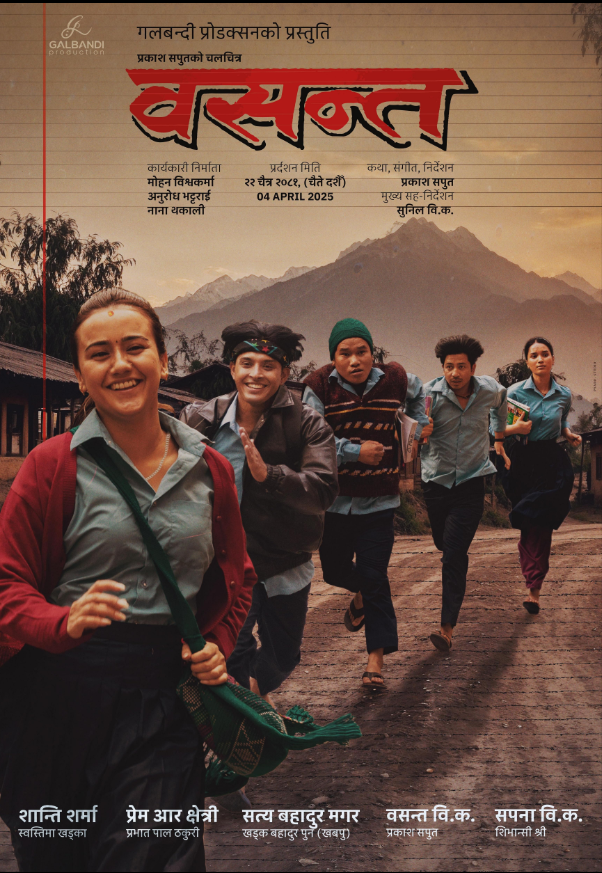Movies
‘Basanta’ tries to do too much
It is an earnest movie that discusses many social issues but in the process loses its narrative focus and emotional depth.
Sanskriti Pokharel
‘Basanta’, the debut directorial movie of Prakash Saput, arrives with good intentions. It is a film that wants to speak loudly and urgently. About caste. About class. About gender. About education. About patriotism. About menstruation. About almost everything that ever came up in our school’s social studies textbook.
The problem is not that ‘Basanta’ talks about too many things. The problem is it talks about too many things at once with little narrative cohesion and almost no room for the viewer to breathe.
In its pursuit to address society’s deepest wounds, the film forgets to tell a story that moves us.
The film’s dialogues, throughout, are laced with literary tones. The choice of words is carefully considered and lyrical. Combined with Saput’s musical talent, the film, though dialogue-heavy, is punctuated by strong local soundtracks that bring in flavours of Baglung and the hills. These two elements, dialogue and music, are the film’s strongest assets. They give the audience some break amid the narrative clutter.
But ‘Basanta’ does not stop at lyrical beauty. It wants to be more than art. It wants to be a movement—a voice for the voiceless. And in doing so, it opens the floodgates of social issues and lets them all rush into the script with little structure or pacing.
There is a subplot of caste discrimination. Another one on alcoholism. Then comes a segment on gender discrimination. There’s also commentary on the flawed education system, police abuse, and the indignity faced by ‘Peon’ workers. Add to that romantic subplots, struggles of inter-caste marriage, and the economic barriers to success. And that’s just to name a few. Because of too many subplots, the audience will have difficulty remembering them all.
Each of these issues deserves space. But in ‘Basanta’, they are all crammed into a single narrative, jostling for screen time. As a result, none of the issues land with the emotional weight they deserve. Instead of a well-crafted film, it begins to feel like a collection of loosely connected short films.
What suffers most under the weight of these issues is the protagonist’s story. Basanta, played by Saput himself, is a character who should be the heart of the film. He is a grade 10 student from a marginalised caste, navigating the social milieu of rural Nepal. But his arc never really takes centre stage. His life becomes a backdrop for the social messages rather than the other way around.
This is where ‘Basanta’ falters most. Its intention to raise awareness overshadows the storytelling. There is a lack of narrative focus. We are not shown why Basanta’s struggle matters on a human level. We’re simply told it should. And that is never enough for a film to resonate.
Also, as a character, Basanta dreams of revolution and writes passionately about equality and social change. But when it comes to his life, he hesitates to marry his love interest, Shanti (played by Swastima Khadka), a woman from a Brahmin family. His actions don’t reflect his ideals. If he believes in breaking caste barriers, that change should begin with him. This disconnect feels like a flaw in his characterisation.
Even the central issue of caste discrimination, which gets the most screen time, has already been explored in Nepali cinema. Without a fresh perspective, the message feels repetitive rather than revolutionary.

The film’s supporting characters, such as Prem and Sapana and many more, seem to exist only to drive the message forward. They don’t breathe, don’t evolve, don’t linger. They enter the screen, say what needs to be said, and exit. Whether it’s the love interest, the teacher, or the police officer, each is reduced to a symbolic presence.
The romantic subplot between Basanta and Shanti is one such example. While their chemistry initially seems promising, it soon loses all sense of realism. In the final scene, Shanti appears at Basanta’s book launch pregnant and glowing, but Basanta offers no visible reaction. No joy, no warmth, not even mild surprise. Instead, he gets up and hugs only when he sees his mother. It’s a moment that reduces Shanti’s role to a mere footnote.
The direction often feels rushed. Some scene transitions are awkward and discordant. A heartfelt moment abruptly cuts to a subplot and then to another, with little coherence. This disjointed narrative structure makes it hard to stay emotionally invested. Just when a scene begins to build momentum, it cuts away to something entirely different.
All these factors are worsened by the film’s length. ‘Basanta’ stretches a lot in its runtime. It drags certain scenes for far longer than necessary. In particular, the second half of the movie begins to test the audience’s patience. It loses rhythm. A tighter edit and more focused script would have elevated the film significantly.
Despite all its flaws, ‘Basanta’ is not a film to be dismissed entirely. It is earnest. Its creator, Saput, is someone who cares about society, who wants change, and who believes in the power of cinema to inform and inspire. There are moments where his sincerity shines through, such as a musical interlude, a poetic dialogue, and a quiet exchange between mother and son.
The film also deserves credit for local authenticity. The setting of Baglung brings with it cultural texture and warmth. The film speaks with an accent. The music, too, is rooted in local sounds and sensibilities.
‘Basanta’ could have been a powerful film. It had the tools: poetic dialogues, strong performances, musicality, and a setting rich with potential. But it tries to do too much. It forgets that stories matter not because of how many issues they raise but how deeply they let us feel one.
Basanta
Director: Prakash Saput
Cast: Prakash Saput, Swastima Khadka, Prabhat Pal Thakuri
Duration: 140 minutes
Year: 2025
Language: Nepali




 9.12°C Kathmandu
9.12°C Kathmandu











